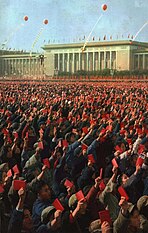Baizuo
| Part of a series on |
| Conservatism in China |
|---|
|
Baizuo (Chinese: 白左; pinyin: báizuǒ, Mandarin pronunciation: [pǎɪ.tswò]; literally "white left") is a derogatory Chinese neologism used to refer to Western liberals and leftists and to their values, especially in relation to refugee issues and social problems. The term originated in the 2010s, probably initially to mock American and Western communists who traveled to China to support the communist revolution and has since come into widespread use due to Chinese netizens' criticism of Western liberal to leftist ideologies and of European governments, particularly Angela Merkel and the German government, for their alleged over-tolerance to immigration issues, and to netizens' praise of Donald Trump's populist policies. The term has begun to be widely used in English as well, most notably by American conservatives.
Etymology
The word is made up of two Chinese morphemes,
Three meanings of the term have been specified through analysis: the term represents a perceived racial distinction in the global racial hierarchy by the Chinese people; through the term, the racial other has been identified as a racial traitor; the term refers to a group of people who are perceived to have a destructive influence on developed civilizations, including China, and Chinese nationalists must take the side of the global rightists against the damage leftists allegedly cause to civilization.[6] It is also related to another term, shèngmǔ (simplified Chinese: 圣母; traditional Chinese: 聖母; pinyin: shèngmǔ; literally "Holy Mother"), a reference to those whose political opinions are perceived as being sympathetic towards immigration. These words have analogies with English words like libtard, but they also partially encompass the Chinese view of classical Western culture.[7]
Usage
2015 European migrant crisis

The term comes up often under topics related to the
The white left have turned the beautiful and affluent Sweden into a notorious 'rape capital' ... I feel so lucky that I am Han Chinese (hanzu): our nation can never be assimilated by the inferior culture of extreme Islam, past, present, or future.[11]
from a post on the Zhihu platform, December 19, 2017
Several nationalist narratives—some of them identical to the
Donald Trump 2016 presidential campaign
Similar to the case during the 2015 European migrant crisis, the support for American right-wing populism has also been seen as a result of Chinese pragmatism.[22] For nationalists, the use of the term is accompanied by expressions of China's rise and sense of competition.[1] For liberal intellectuals, the criticism of the "white left" and the praise of Trump also represent their non-nationalist sentiment and pro-market sentiment.[23]
Usage by American conservatives
In fact, they have a name for our self-hating professional class. They call them baizuo. The rough translation from Mandarin is 'white liberal', and it is definitely not a compliment.[24]
Tucker Carlson, March 20, 2020
Since the popularity of the term in China, conservatives in the United States, especially nationalist conservatives, have also begun to use the term. Prominent conservatives Tucker Carlson and Rod Dreher have used the term to criticize American leftist and liberal ideas. In March 2020, Carlson introduced the term on his television show, while Dreher used "baizuocracy" to describe "white leftist government". The use of the term has been described as embodying a shift in the attitudes among a section of the American right that now expresses admiration for China and believes that it will prevail over the liberal-leaning United States.[25] There are claims that American conservatives misuse the term and ignore the debate about Chinese nationalism and "geopolitical Darwinism".[24]
Laissez-faire in usage
Despite its possible
See also
Notes
- ^ simplified Chinese: 西方"白左"和中国"爱国科学家"的伪道德; traditional Chinese: 西方"白左"和中國"愛國科學家"的偽道德; pinyin: Xīfāng báizuǒ hé zhōngguó àiguó kēxuéjiā de wěidàodé
- ^ According to Li Shuo's original article, he refers to Erwin Engst and Joan Hinton.
- Li 2010: "古人云"来而不往非礼也",天朝不但在物流上被美帝非礼,一船船的货真价实的商品运到美国去,换来的却是堆积如山的冥币(见《人民币?人冥币!》),人流上也被美帝非礼,一飞机一飞机货真价实的的知识分子运到美国去,换回来的是零星的"爱国科学家"以及更为罕见的"白左",前者以钱学森、钱伟长、萧光琰为代表,后者以阳早、寒春夫妇为代表。" [As the old saying goes, "It is impolite not to reciprocate," but not only is the Celestial Empire being treated impolitely by the American Empire in terms of logistics – a boatload of genuine goods shipped to the United States, in exchange for a mountain of hell money (see "People's Currency? People's Hellish Currency!") – but also being treated impolitely in terms of people – a plane of genuine intellectuals were shipped to the United States in exchange for a smattering of "patriotic scientists" and the even rarer "white left", the former is represented by Qian Xuesen, Qian Weichang and Xiao Guangdian, and the latter by Erwin Engst and Joan Hinton.]
References
Citations
- ^ a b Huang 2021.
- ^ a b Wang 2019, p. 69.
- ^ Xu 2020.
- ^ Zhang 2017.
- ^ Cheng 2019, p. 284.
- ^ Cheng 2019, pp. 280–281.
- ^ a b Gan 2020, p. 25.
- ^ Gan 2020, p. 25; Zhang 2020, p. 96; Lin 2021, pp. 95–96.
- ^ Shen 2020, p. 26; Zhang 2017.
- ^ Zhang 2017; Gan 2020, p. 21.
- ^ a b Zhang 2020, p. 100.
- ^ Shen 2020, pp. 26–27; Gan 2020, p. 26.
- ^ Shen 2020, p. 28.
- ^ Wang 2020, p. 130.
- ^ Gan 2020, p. 25; Zhang 2020, pp. 101–104.
- ^ Shen 2020, p. 29; Zhang 2020, p. 101.
- ^ Wang 2020, p. 137; Shen 2020, pp. 29–30.
- ^ Lin 2021, pp. 85–86; Zhang 2020, p. 96.
- ^ Lin 2021, p. 86; Zhang 2020, p. 96; Carlson 2018.
- ^ Chen 2022, p. 176.
- ^ Hendriks-Kim 2023; Lin 2021, pp. 88, 95–96; Gao 2023, pp. 27, 39–40.
- ^ Zhang 2017; Lin 2021, p. 86.
- ^ Lin 2021, p. 90.
- ^ a b Wong 2022.
- ^ Wong 2022; Weigel 2021.
- ^ Zhang 2020, p. 108; Chen 2022, pp. 175–176.
- ^ Cheng 2019, p. 285.
Sources
- Carlson, Benjamin (8 February 2018). "China Loves Trump". The Atlantic. Retrieved 17 April 2023.
- Chen, Ge (2 January 2022). "How equalitarian regulation of online hate speech turns authoritarian: a Chinese perspective". S2CID 249942141.
- Cheng, Yinghong (2019). Discourses of race and rising China. Cham, Switzerland: ISBN 978-3-030-05357-4.
- Gan, Chun (February 2020). "Discourse on Europe's Migrant Crisis in Chinese Social Media: Recontextualising Nationalism and Defending Perceived Homogeneity". S2CID 213609606. Retrieved 17 April 2023.
- Gao, Gengsong (April 2023). "Chinese Centrist Liberal Critics of Trump: A Reconsideration of Contemporary Chinese Liberalism". S2CID 250234429.
- Hendriks-Kim, Eric (January 2023). "Why China Loves Conservatives". First Things. Retrieved 20 April 2023.
- Huang, Frankie (27 March 2021). "'Baizuo' Is a Chinese Word Conservatives Love". Foreign Policy. Retrieved 16 April 2023.
- Li, Shuo (2010). "西方"白左"和中国"爱国科学家"的伪道德" [The Fake Morality of the Western "White Left" and the Chinese "Patriotic Scientists"]. Renren Network (in Simplified Chinese). Archived from the original on 22 October 2012. Retrieved 16 April 2023 – via Boxun.
- Lin, Yao (2 January 2021). "Beaconism and the Trumpian Metamorphosis of Chinese Liberal Intellectuals". S2CID 216155640. Retrieved 17 April 2023.
- Shen, Qinna (2020). "Merkel the German "Empress Dowager"? Reactions to the Syrian Refugee Crisis in China and other East Asian Countries". Transit. 12 (2): 23–46. S2CID 236839652. Retrieved 17 April 2023.
- Wang, Jing (31 December 2020). "Limits of Multicultural Imagination and the Anti-Refugee Controversy in Contemporary China". Journal of Contemporary Eastern Asia. 19 (2): 125–147. . Retrieved 17 April 2023.
- Wang, Xingfu (2019). "Critical Theory in Regressive Times: Liberalism, Global Populism and the "White Left" in the Twenty-First Century". Acta Universitatis Lodziensis. Folia Philosophica. Ethica-Aesthetica-Practica. 34: 67–77. Retrieved 16 April 2023.
- Weigel, David (2 December 2021). "Analysis | The Trailer: In three swing states, abortion bans could be on the midterm ballot". ISSN 0190-8286. Retrieved 25 January 2022.
- Wong, Mason L. (17 October 2022). "Confucius Envy". Commonweal Magazine. Retrieved 20 April 2023.
- Xu, Chaoyi (24 June 2020). "你口中的"白左",指的究竟是谁?" [Who are you referring to when you say "white left"?]. Toutiao (in Simplified Chinese). Southern Metropolis Daily. Archived from the original on 20 April 2023. Retrieved 16 April 2023.
- Zhang, Chenchen (11 May 2017). "The curious rise of the 'white left' as a Chinese internet insult". openDemocracy.
- Zhang, Chenchen (March 2020). "Right-wing populism with Chinese characteristics? Identity, otherness and global imaginaries in debating world politics online". S2CID 181854953. Retrieved 17 April 2023.
Further reading
- Mair, Victor (17 May 2017). ""White left" — a Chinese calque in English". Language Log. University of Pennsylvania. Archivedfrom the original on 21 May 2017. Retrieved 1 May 2020.
- Mair, Victor (22 March 2021). ""White left" — a Chinese calque in English, part 2". Language Log. University of Pennsylvania. Retrieved 20 April 2023.
- Zhang, Chenchen (24 April 2024). "Race, gender, and Occidentalism in global reactionary discourses". ISSN 0260-2105. Retrieved 25 May 2024.


